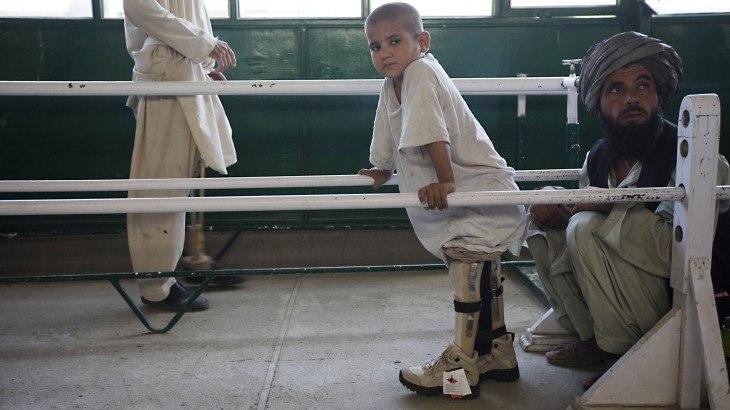A survey by Afghanistan Independent Human Rights Commission (AIHRC) says that majority of persons with disability (PWD) in Afghanistan do not have access to their basic rights. The survey, in which 979 PWD have been interviewed in 28 provinces, indicates that most of PWD do not have access to education, health service and employment.
Speaking at the launching ceremony of the report on Sunday, February 08, in Kabul, AIHRC commissioners urged the Afghan government authorities to take initiative for PWD rights.
The Afghan government need to establish rehabilitation centers for persons with mental disability, provide education opportunities for PWD and launch campaign awareness on PWD rights.
The AIHRC also urged the Afghan government to conduct a “national census survey” to collect statistics about the actual number of people with disabilities in Afghanistan.
Of the 979 interviewees, who are mostly above the age of 26, 193 are women and the remaining are men. According to the report, 696 respondents have physical disabilities, followed by people with multiple disabilities, persons with vision impairment, persons with hearing loss, and persons with intellectual disability.
Employment Opportunity
As the report findings indicate, more than 50 percent of the respondents, who have been interviewed, are unemployed. Among 979 interviewees, only 209 are employed with 71 percent of them working as freelancers, 71 percent working in government offices, and 12 percent working with NGOs.
State Minister for Martyrs and Disabled Affairs, Lalluddin Aryoubi, says that there is a very limited employment opportunity for persons with disabilities, even those who are educated. “Around 80 percent of persons with disabilities do not have access to employment opportunities,” he told reporters.
Afghanistan Law on the Rights and Privileges of PWD stipulates that, at least, three percent of the government employees need to be persons with disabilities. According to the new employment procedures jointly developed by AIHRC and Independent Administrative Reforms and Civil Service Commission, the employment quota of PWD has increased and some facilitation are made for PWD in vacancy announcements and hiring process.
Afghanistan joined the Convention on the Rights of Persons with Disabilities and its Optional Protocol in 2012 which obliges the Afghan government to provide equal employment opportunities for PWD.
Currently, the Afghan government pay a monthly stipend for PWD affected by war. But, those who are born with disabilities are deprived of the compensation. Describing it as a discriminatory action and contrary to Afghanistan Constitution and the convention on the rights of person with disabilities, AIHRC commissioner, Banafsha Yaqubi, called on the government to end such discriminatory behavior.
Rights to Education
The AIHRC report suggests that out of 979 interviewed PWD, only 123 of them have access to education. “Our findings show that 99 interviewees study in schools and 24 in universities,” the report detailed, adding that of the 99 students attending school, 63 are in public schools, 33 attend special schools, and 3 attend private schools.
Lack of access to literacy centers, long distance to schools, economic problems, and lack of facilities for PWD in public schools are major obstacles faced by persons with disability.
According to the State Minister for Martyrs and Disabled Affairs, there is one person with disability in every five families in Afghanistan most of whom do not have access to education in villages and districts, and 20 percent of PWD, who are living in urban areas, have access to education facilities.
Political participation and health care
The AIHRC findings show that PWD face challenges in exercising their right to vote in election processes. The report says that PWD do not have “adequate and full access” to health services. “Long distance to health facilities, inaccessibility of clinics and hospitals, and lack of adequate medicine are major challenges,” the report stated.
Social challenges against PWD
Negligence, discrimination, movement restrictions, restrictions on family event attendance, and disability-related stigma are listed as challenges which are imposed on the persons with disabilities at family level. 336 respondents have said that their families are neglecting them for their disabilities. At community level, the report has found that they are facing inattention and physical violence.
According to the National Statistics and Information Authority, there are around 950,000 persons with disabilities in Afghanistan which counts for three percent of the total population of the country. The International Red Cross Committee (IRCC), however, announced in 1397 (solar year) over one million population of the country have different disabilities.




